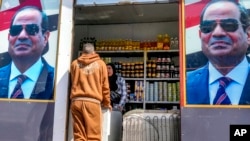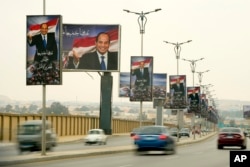Egypt is in an economic crisis made more severe by Russia’s invasion of Ukraine. The conflict, now in its second year, has increased food and energy prices.
High inflation, the low exchange value of Egyptian money and unpopular government policies all add to Egypt’s problems.
The crisis has pushed many Egyptians out of the middle class. The country’s poor — about one-third of the population — are cutting back on basic goods. Many are asking how long they can survive like this.
Hany Hassan has found himself struggling to feed his four young children. Pay from his job at a cafe is buying less and less.
Hassan, who is 43 years old, earns about $110 a month working 12 hours a day seven days a week. “I am scared that one day I won’t be able to feed the kids," he said.
Yearly inflation reached 26.5 percent in January, the highest rate in five years. Food prices in urban areas have increased 48 percent.
Many important goods like rice, cooking oil, bread and most recently, eggs, have all doubled in cost in Cairo’s supermarkets. The prices of chicken and other meat have almost doubled from a year ago.
The war in Ukraine hit Egypt where it is financially weak. The most populous Arab country and world's biggest importer of wheat needs to buy most of its food from other countries.
Egypt’s import costs first increased because of higher world prices for things like fuel and wheat that are purchased in dollars. This led to foreign currency shortages, said Callee Davis, an economist at Oxford Economics Africa, a business advisory company based in Britain.
The low exchange value of Egypt’s money forced the Central Bank of Egypt to pass policies to preserve the country’s foreign reserves. The policies included restrictions on imports. That drove inflation even higher, Davis said.
For many Egyptians, difficulties began in 2016 when President Abdel Fattah el-Sissi’s government started a reform program. The program aimed to reform Egypt’s economy in return for loans from the International Monetary Fund (IMF). The program introduced new taxes and included large cuts in state subsidies for basic goods.
Western governments and international financial institutions supported the spending cuts. However, they have made life difficult for many Egyptians. El-Sissi has blamed the war in Ukraine for the most recent inflation.
To help poor and middle-class families, the government increased social welfare programs and raised pay for government workers. It also delayed cuts to subsidized bread and planned electricity price increases. The government also created hundreds of government-owned markets that sell basic goods for low prices.
The government received a new loan from the IMF last year, the fourth in six years. The hope is that the $3 billion deal will help Egypt’s international and regional partners provide another $14 billion. Possible lenders include wealthy Gulf countries.
But Gulf Arab states seem increasingly unwilling to help Egypt as they have over the past 10 years.
“We want to help, but we want you also to do your part,” said Saudi Finance Minister Mohammed al-Jadaan at the World Economic Forum in January.
Egypt has promised to keep the IMF-guided reforms. Those include an exchange rate set by foreign exchange markets and lessening the military’s hold on the economy.
But Egyptian leaders are facing criticism for their handling of the economy. They have created costly infrastructure projects, like a new $45 billion capital building, other developments and highways. The government has defended the projects as important for improving living conditions. It also says the projects create jobs for the growing population.
H. A. Hellyer is a political expert at the Royal United Service Institute for Defense Studies in London. He said the pressures on the Egyptian economy would be difficult for any government.
“Some good moves have been taken, the question is whether these are sufficient to turn the economic crisis around or not,” he said.
I’m Dan Novak.
Dan Novak adapted this story for VOA Learning English based on reporting by The Associated Press.
______________________________________________________________________
Words in This Story
foreign reserves –n. foreign money held by a nation’s central bank
subsidy — n. government payments aimed at keeping the price of some product or service lower than it would be without the payments
regional — adj. related to an area, within a country or the world, that is separate for some reason
infrastructure — n. structures, such as roads, bridges, ports and airports, that are needed for a modern society
sufficient — adj. enough







Forum